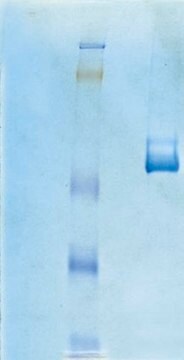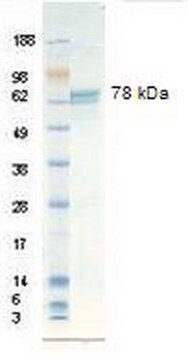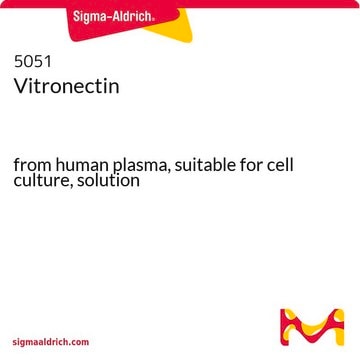CC130
Human Vitronectin
recombinant, expressed in E. coli, liquid, 0.5 mg/mL, used as an effective xeno-free alternative to matrigel, suitable for human ES and iPS cell culture, PLURISTEM®
Synonym(s):
S-protein, Serum-spreading factor, V75
About This Item
Recommended Products
product name
PluriSTEM-XF® Recombinant Vitronectin, Human pluripotent stem cell culture.
biological source
Escherichia coli
human
Quality Level
Assay
≥92% (SDS-PAGE)
form
liquid
manufacturer/tradename
PluriSTEM®
concentration
0.5 mg/mL
technique(s)
cell attachment: suitable
cell culture | mammalian: suitable
cell culture | stem cell: suitable
input
sample type: human embryonic stem cell(s)
UniProt accession no.
shipped in
dry ice
Related Categories
General description
PluriSTEM Recombinant Vitronectin is a truncated form of human vitronectin (gene 20-398 aa fragment) that was constructed with codon optimization, expressed in E. coli and purified as inclusing bodies. The final product was refolded using a unique “temperature shift inclusion body refolding” technology and chromatographically purified. The final product is considered xeno-free.
Application
Stem Cell Research
Cell Structure
ECM & Adhesion
Quality
Physical form
Storage and Stability
Legal Information
Storage Class Code
10 - Combustible liquids
WGK
WGK 2
Flash Point(F)
Not applicable
Flash Point(C)
Not applicable
Certificates of Analysis (COA)
Search for Certificates of Analysis (COA) by entering the products Lot/Batch Number. Lot and Batch Numbers can be found on a product’s label following the words ‘Lot’ or ‘Batch’.
Already Own This Product?
Find documentation for the products that you have recently purchased in the Document Library.
Customers Also Viewed
Articles
Skip weekend feedings. Defined serum-free and feeder-free expansion media for human pluripotent stem cells (ES and iPS cells). See publications and protocols.
Fibroblast growth factors (FGFs) regulate developmental pathways and mesoderm/ectoderm patterning in early embryonic development.
The Simplicon™ RNA Reprogramming Technology is a next generation reprogramming system that uses a single synthetic, polycistronic self-replicating RNA strand engineered to mimic cellular RNA to generate human iPS cells.
Protocols
Step-by-step stem cell culture protocols for human induced pluripotent stem cells (iPSCs) including ips cell thawing, expanding, freezing and characterizing.
Stem cell reprogramming protocols to generate human induced pluripotent stem cells (iPSCs) including viral and non-viral RNA based methods.
This page covers the ECM coating protocols developed for four types of ECMs on Millicell®-CM inserts, Collagen Type 1, Fibronectin, Laminin, and Matrigel.
Our team of scientists has experience in all areas of research including Life Science, Material Science, Chemical Synthesis, Chromatography, Analytical and many others.
Contact Technical Service













